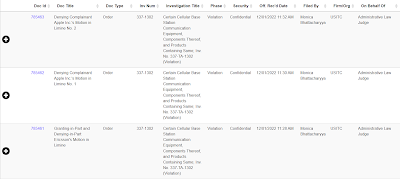Apple knows that sooner or later Ericsson will have decisive leverage from some of its numerous patent enforcement actions, and while there will always be a huge asymmetry in exposure, the iPhone maker would like to get at least a little bit of mileage out of its countersuits. That's easier than done, though. Earlier this week, a German court threw out Apple's first patent lawsuit against Ericsson, over a patent that was granted to Tony Fadell, who oversaw the development of the iPod and is one of the co-creators of the iPhone (before he went on to co-found Nest) as I mentioned yesterday.
Apple's pursuit of a U.S. import ban over three mmWave patents raises public interest questions: that's critical network infrastructure, a factor that the United States International Trade Commission (USITC, or just ITC) has to take into account. Apple brought a motion in limine, asking the Administrative Law Judge (ALJ) presiding over the investigation of Apple's countercomplaint to exclude any argument Ericsson might make at next week's trial for a service-and-repair carve-out (should an exclusion order issue at all).
The Office of Unfair Import Investigations (OUII, commonly referred to as the "ITC staff") actually recommends a superset of a service-and-repair carve-out: the ITC staff says that geographic areas in which Ericsson base stations are already in use should not be affected. In addition, the ITC staff filed a response to Apple's motion in limine and said "Ericsson could have more clearly expressed its intention to request a service-and- repair exemption in its contention interrogatory responses," but "it was reasonably foreseeable that Ericsson would request a service-and-repair exemption." Therefore, the staff also opposed that motion in limine.
On Thursday, ALJ Monica Bhattacharyya ruled on the parties' motions in limine. She denied either of Apple's motions: the one I just mentioned (service and repair), and one targeting Ericsson's defenses to Apple's indirect infringement theories. Those two are somewhat related: as Ericsson explained in one of its filings, the majority of the accused products are actually assembled in the U.S., but certain components are imported. Apple needs an indirect infringement theory in order to obtain an import ban on such components. The fact that Ericsson makes base stations in the U.S. (unlike its main competitors) is another reason for which the ITC may just be the wrong forum for what Apple is trying to accomplish.
Ericsson's only motion in limine has been granted in part. Ericsson said some of Apple's claim construction and validity arguments were untimely.
ALJ Bhattacharyya's decisions are sealed for the time being, but the following screenshot from the ITC docket shows the outcome (click on the image to enlarge):
This is not a good pretrial outcome for Apple.
Starting Monday, the United States District Court for the Eastern District of Texas will hold an Ericsson v. Apple FRAND trial. It is the first situation in this dispute where a settlement would make a lot of sense, but it depends on how far apart the parties' positions are. That's what I also replied to someone on Twitter who wrote he had the feeling the Texas trial wasn't going to take place. The time would be right for a settlement, but sometimes a dispute isn't ripe for settlement because the parties can't bridge their disagreement on the terms. And then those trials go forward and verdicts and rulings come down...
